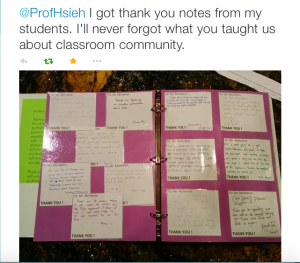A quote often attributed to Mahatma Ghandi urges us to be the change we wish to see in the world, and in my professional world, the change I’ve been wishing to see for a long time is a change in the discourse around teacher education. I am a proud teacher educator. Although it was a very difficult decision for me to leave my 8th grade classroom for the world of academia, what compelled me to do so was the opportunity to make a difference for generations of future educators through my position in a College of Education, working with pre-service teacher candidates who would then make a difference for generations of future students.
Recently, the Federal Department of Education proposed new federal guidelines for teacher preparation program accountability. These new guidelines included narrow accountability measures and “institutional report cards” that are likely to punish innovation in teacher education, with projected impact to fall hardest on institutions serving future teachers (and communities) of color and candidates seeking to teach in high needs fields. The American Association of Colleges for Teacher Education (AACTE) issued a 38-page response to these new accountability measures on behalf of the 800-Teacher Preparation Programs it represents and urged members to submit comments during the response period which just closed this past Monday, February 2. Now that the public review period is over, we are waiting for federal response, however, as we wait, I would urge my fellow teacher education colleagues to advocate in everyday ways in our classroom. Here are just a few ways that I hope to continue to be the change I wish to see.
Modeling Strong Teaching Practice
Last night, after a class session that I didn’t think was my strongest, I had a student say to me, “That class was pretty amazing. I have so many notes and I took so much from it.” Then another said, “Yeah, if this class wasn’t so engaging, I’d totally be asleep right now.” Finally, a third said, “I just want to say that what you taught us about having objectives, I really appreciate that in this class, you actually have objectives for us to focus on so we know what we’re taking from each session. I don’t see that in every class and it’s really helpful to see you using the ideas that you want us to use. It’s important, even at this level, for us to have this type of modeling of practices in this classroom.” It had been a close to an 18-hour day so their feedback was really gratifying.
I realized that even on days that I don’t think are my strongest, I’m modeling dispositions and enacting practices that I want students to see–dispositions like authenticity and flexibility, and practices like embedded opportunities for structured communication, interaction and collaboration (Think-Pair-Shares, Quickwrites, live tweeting–which has just started happening in lecture this semester [!], text idea exchanges, diagramming ideas on the board, structured discussions, etc.) which occur every lecture, in addition to the specific content-related strategies that are referenced and modeled for students. While I won’t feel like a champ after every lecture, at least I know that every class that I put together is based on strong pedagogical principles that will be something of value to my candidates and their future classrooms.
Giving Feedback to Support Development
Last night’s feedback was critical to helping me think about my own practice, but feedback more generally is a critical part of my role as a teacher educator. Whether it is giving timely, thoughtful feedback on students’ assignments or addressing issues that arise in class professionally but personally, feedback is essential to the work that we do.
In talking about literacy development last night, one student mentioned that repeated practice is the key to success. I gently reminded him that practice with feedback was actually what I saw as the key to growth, to which another student replied with a quote from his former mentor, “It’s not practice that makes perfect, it’s perfect practice that makes perfect.” And, we can only practice perfectly when we know what it is we’re doing that needs improvement.
Pursuing Professional Growth: Collaborative and Reflective
Sometimes I feel stuck in a rut and then I reach out to my communities or look for new resources, either via social media, through reading, in person or by attending professional conferences. After pursuing these avenues for growth, I leave feeling inspired and refreshed. Working together and seeking to continually grow and improve, pushing oneself towards innovation while being authentic to one’s identity is key to professional development. At the same time, I am a strong believer in reflection promoting growth. Just as I ask my students to reflect on their own identities and their own developing practice, I continue to reflect on my own, using this blog as my main vehicle.
Advocating for Ourselves by Making Our Work Public
Finally, as teacher educators, we have to make our work public, just as the great work that is happening in classrooms needs to be made more public. Too often, what populates the media about teachers are examples of those that dishonor the profession. Often only when teachers are tragically lost or on teacher appreciation days do we recognize the countless others who are doing great work in their classrooms. As teacher educators, we need to feature the work that we are doing, that our candidates are doing and that their students are doing. We must reclaim the idea of what evidence counts in making our work value added. Yesterday, among the tweets that I received was this awesome example from a student of the ripples that our work causes in classrooms all over our communities:
Evidence like this symbolizes the difference we make. We must find and make public the power of our work, using varied sources of evidence to advocate for the work that we do. We must continue to be the change we wish to see in our world.

